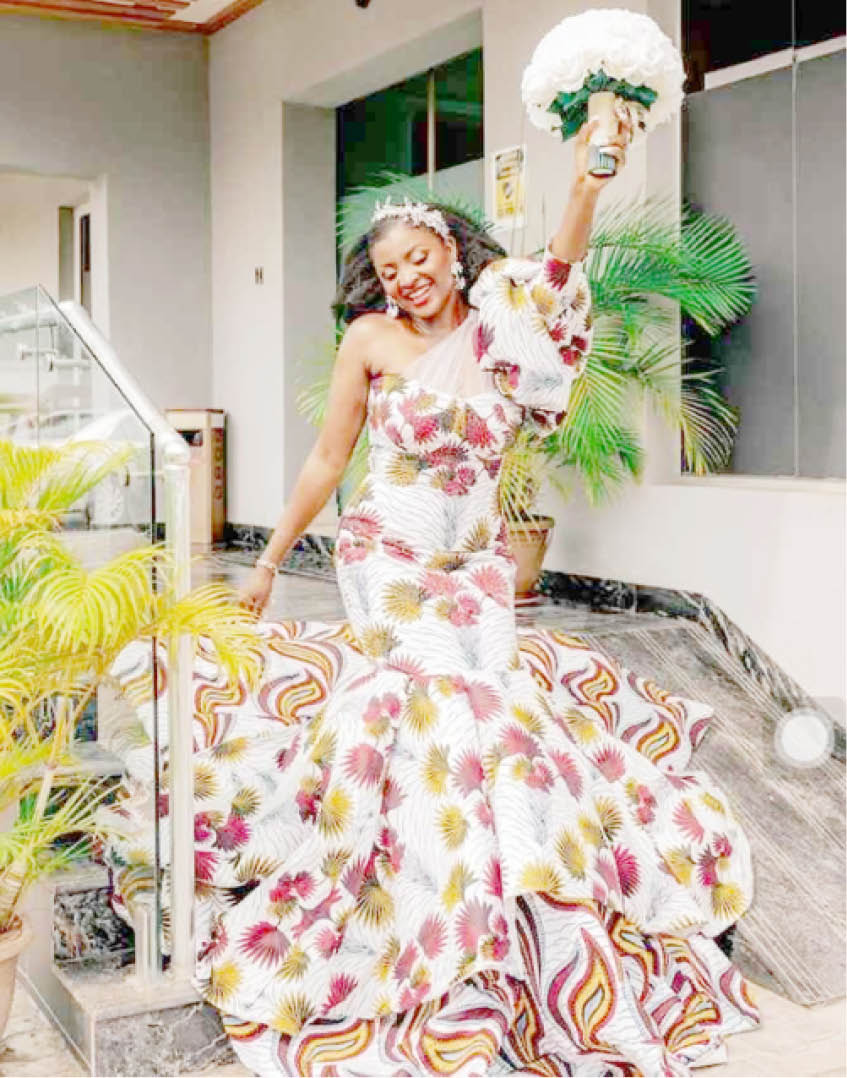Among all the fabrics patronised by Africans, Ankara stands out. Asides from being used for clothes, it is now being used to make shoes, household, fashion items and décor as people around the world are gradually keying into the trend. Recently, a Nigerian bride used the fabric for her wedding gown which got people talking about keying more into the Nigerian local content. Daily Trust Saturday explored how durable and acceptable the material has become in Africa.
Recently, a picture surfaced on the internet of a bride, Chioma Inyang, who made a bold choice to use the Ankara fabric to sew her wedding dress. The dress sparked a lot of conversation in the social media. While some people argued that the women chose the fabric out of lack of money to get a better wedding gown, others praised her choice and commented on how beautiful the fabric was.
- Herdsmen initiate plan to sack criminals among them
- Edo to reclaim forest reserve from banditry, kidnapping
Speaking during an interview with the British Broadcasting Corporation (BBC), Chioma noted, “Lack of money wasn’t the reason I chose to sew my wedding dress with Ankara. The problem we have now is that we haven’t acknowledged our African roots. As a child, I told myself that on my wedding day I would wear a traditional African dress.”
Also, in an interview with the Cable News Network (CNN), the fashion designer who made the gown, Belinda Compah-keyeke said the African print was the first point of contact with the people’s culture. “When we are born we are wrapped in a wax print. It is a major part of every African’s heritage. Every wax print tells a unique African story,” she said.
Fortune Louis Hogan, a Nigerian who trades in Ankara, spoke very highly of the fabric, saying it can be styled to suit any occasion.
“Unlike other materials, with Ankara you can decide to sew a traditional or English style; and both outfits will come out nice and unique.
“The beauty of the high quality Ankara is how durable they are. It is possible to use them for many years and they will not fade. Even when you wash them over and over again, the fabric remains intact,” she said.

She said the Ankara she traded in were imported and shipped through three main cities – Ibadan, Lagos and Kano.
“Ankara comes in different qualities, such as medium and deluxe hollandaise. Prices often range from N4,200 to N22,000 for six yards. However, the price range of what I sell is from N5,500 to N25,000, depending on quality,” she added.
Also, a woman who simply identified herself as Deborah said household items produced from Ankara are as durable as products from other materials.
“Products made from Ankara are as durable as any other material. However, the durability depends on the quality of the fabric used. That is why we ensure that all African prints we use for production are water-tested to ensure quality,” she said.
Ankara appears to be the most appreciated fabric in West Africa. In some traditions it is compulsory that a man coming to marry a woman must come with boxes of different Ankara prints.
The beauty of this is the fact that people are beginning to know that it is honourable to be African. It is, therefore, necessary that as Africans we create mementos and events that would showcase the African culture and appreciate how priceless it is.
The Ankara fabric has many names, such as African Holland or Dutch wax. Although not of African origin, the Ankara fabric is deeply appreciated by Africans as it shares deep similarities with the African culture.
Although fully embraced by Africans, Ankara did not originate from the continent. It was created in Dutch and mass-produced for the Indonesian market, but when it was patronised more in West Africa, it became a representation of African traditions and cultures. From West Africa, it began to spread and dominate other parts of Africa.
One of the interesting things about Ankara is how each design and pattern is unique, especially when compared to how pale and bland other fabrics can be. No two materials explore the same design. And they come in different colours and shades.
In Nigeria, Ankara is regarded as a very special material, so it is not worn all the time. Most people tend to wear it on days they believe to be special or during events, such as the aso-ebi used for weddings and other occasions
Aside attires for both male and female, a few entrepreneurs have decided to branch out of the norm and explore what other beautiful products can be made from the material, including bed-sheets, tablecloths, ties, table mats, baby carriers etc.
Deborah Akingboye, an Abuja-based entrepreneur who creates home essentials using Ankara said, “I have been in this business for two years, and I must say that people are beginning to appreciate the use of Ankara for other things, apart from cloths.”
Because Ankara is embraced widely by many Nigerians, it is sold in every market. Deborah explained that since the fabric is popular, she sourced it from different parts of the country. She also said the prices depended on quality.
Deborah’s brand, uses Ankara to make beddings, duvet, throw-pillows, table runners, chair covers, drawstrings and curtains.
“Our prices range from N1,500 to N25,000. Our 14-inch throw-pillows range from N1,500 while our king size duvet with bed-sheets cost N25,000.
“The prices are not fixed because sometimes, customer’s specification will change the prices of goods. In most cases, we always try to work with customers’ budgets,” she said
Deborah is glad that her business receives enough patronage. “We get orders for different products frequently. Most times, the season also contributes to the type of item that would be requested for. For example, there will be more orders for bed-sheets and duvets during the rainy season.
“Our Instagram highlights a list of different products from our brands; and we take pride in the fact that they are the truth. We are bold to say that so far so good, our reviews have been encouraging.
“We also acknowledge that we have received negative reviews. In such cases, we always work on correcting those issues immediately they arrive.
“In the past, people didn’t understand it, so they found it weird, but in recent times, Ankara designs have slowly eased into our way of life and people are beginning to applaud and appreciate the creativity that comes with it.
“Each time we introduce a new product, the responses we get from customers are really encouraging. This shows that people are slowly but surely appreciating Ankara crafts and designs,” she said.
Omisore Tomilola, another entrepreneur based in Ibadan, uses Ankara for different crafts, such as earrings, bags, key strings, paper bag etc. Tomilola, who has been in the business since 2019, told Daily Trust Saturday that she usually got her material from a popular market in Ibadan, called Aleshiloye. “The price starts from N4,800, “depending on the quality you want to buy,” she said.
However, Tomilola tries to keep the prices of her products affordable. “We have a product that goes for N500, depending on what you want, such as key strings. We also have products that go for N5,000 upwards, which are our handbags and paper bags.
“The beauty of it is that customers are allowed to pick the fabric that will suit the kind of look and colour coordination they are working with,” she added
She, however, said she was yet to build a big customer-base that would patronise her craft. “I don’t really have many customers for now, but those I have are really appreciative and happy with the value they get with their money,” she said.

Also, Mrs Modupe Ogunleye is an Abuja-based tailor who uses Ankara to make different English wears, such as blazers, trousers, kimonos, jumpsuits etc. She said she found pride in the job as she sees herself as a promoter of the African culture. “Once you are seen wearing Ankara, you are putting on the identity of an African,” she said.
Mrs Ogunleye said she sourced her fabrics from different parts of the country and beyond. She said, “Sometimes I get my material from Lagos, Kano and even Cotonou in Benin Republic. The cheapest you can get a good quality of Ankara material is N3,500; and it comes in six yards, which gives you the opportunity to make either a two-piece outfit or a full dress. If I decide to buy the expensive Ankara, which we call ‘Hollandes’, it will cost about N90,000 and N60,000.”
Her products are sold within and outside the country. In the supply chain of the industry, she is a middleman. “On a daily basis, I have more than six women who place orders for Ankara dresses, including tops that can be used in a formal setting,” she added.
She believes her prices are very fair. She explained that oftentimes, in tailoring, a style might be simple but the accessories, such as stones, that are added to the piece make them costly. “Depending on the style of the jackets, we charge N13,000; and for tops we charge N5,000.
“When an item is custom-made, there is a possibility of errors being made on the dress. Nonetheless, we take pride in saying that our customers love what we sell to them as they always offer positive reviews, return for more, and are willing to even advertise our products,” she also said.
Although a lot of Nigerians are used to the Ankara fabric, a few are still cold towards it, especially the idea of using it for items such as table cloth, earrings, bed-sheets.
Favour Ubong, who spoke to Daily Trust Saturday, said, “There’s no harm in promoting the African culture through using Ankara fabric. My only problem is the fact that the material attracts a lot of attention. I don’t think I will be pleased to walk into a house where I see an Ankara chair cover with and curtain. It will just be too much of colour and pattern contrast.”
Another person who identified himself as Gideon also said, “In fashion, every material and fabric showcases a vibe and mood. The mood showcased when using Ankara is royalty, happiness, excitement, which could be one of the reasons it is mostly used during traditional weddings. However, I believe that the use of Ankara should stick to the fashion industry as the material is not subtle enough to be used as home décor.”
But another woman who was identified as Mrs Shola said, “I see nothing wrong with using Ankara as décor within the house. It mustn’t be splashed all around the house, but simple things like throw-pillows or tablecloths can make your living or dining room unique.”
Sadly, despite the fact that Nigerians highly patronise Ankara, the country’s textile factory is not living up to expectation.
Data uploaded by the National Bureau of Statistics show that there has been an increase in the importation of textile materials into Nigeria. With a record of N200.6 billion worth of textile materials imported in the third quarter of 2020, the country exported N5.05 bn worth of goods during the same period.
In October 2020, the Central Bank of Nigeria announced that it had provided cotton producers with a $300 million loan in recent years, to boost the domestic textile industry, which at some point, was recognised as Africa’s largest.
The ban on the importation of finished textile fabrics to guard the interest of local producers and designers notwithstanding, the federal government spends $4bn yearly. Yet, smuggling still poses a challenge as textile fabrics are smuggled into the country through Benin Republic, Chad and Niger borders.

 Join Daily Trust WhatsApp Community For Quick Access To News and Happenings Around You.
Join Daily Trust WhatsApp Community For Quick Access To News and Happenings Around You.


